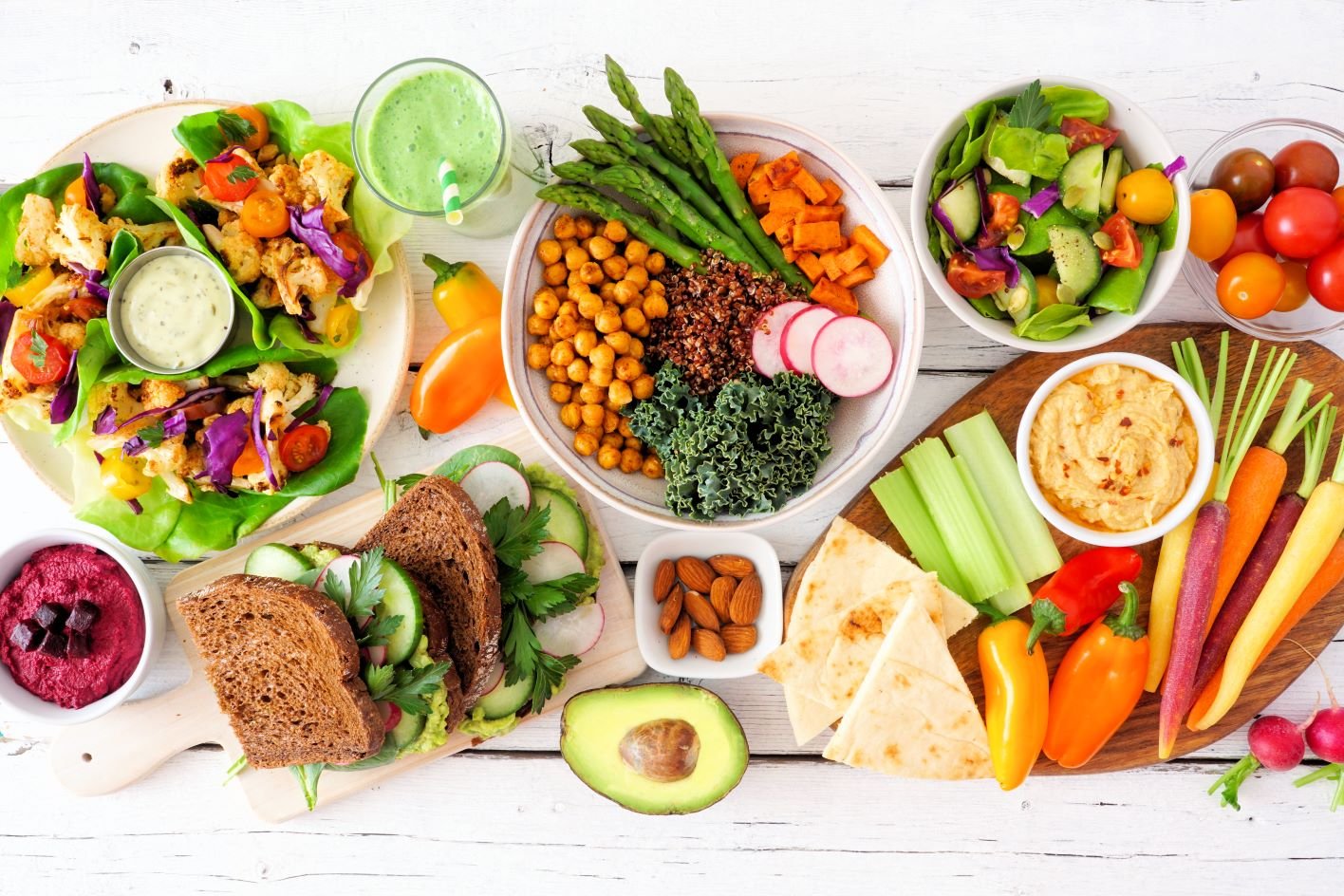Why is eating well good for your mental health?
Mental health is a complicated topic, and many factors can play a role in it, including physical activity and diet. For example:
- Your brain uses about 20% of your energy from food and needs nutritious foods high in vitamins, minerals, antioxidants, proteins, complex carbs, and healthy fats to work properly.
- Eating mostly processed or refined foods can result in a low-nutrient diet, which may alter brain chemicals, meaning your brain could be less protected from damaging free radicals. This may lead to a higher risk of depression and anxiety.
- Your food choices may also affect your gut and the billions of friendly bacteria that form your microbiome. These bacteria protect your gut lining, control inflammation, help you absorb nutrients, and send signals between your gut and brain (called the gut-brain axis) that influence mood and mental health.
- A balanced diet rich in whole grains, fresh fruits and vegetables, oily fish, and seafood , such as with the Mediterranean diet, may lower the risk of depression by 25% to 35% compared to a diet high in processed foods.
But it’s important to know that food isn’t a cure-all.
According to Katherine Basbaum, RD, “mood disorders can last even if you eat well.”
But Basbaum says eating healthy foods sets you up for success. “A healthy diet may improve your overall health and can help lower your risk for mood-related conditions.”

6 Potential Effects of a Healthy Diet on Your Brain and Mental Health
So, what’s the connection between the food you eat and your mental health?
Food is fuel. It delivers key vitamins, minerals, and fats to your body (and your brain!) that help you make serotonin, lower inflammation, and support overall cognitive function, such as learning, memory, and attention.
1. Protect your brain with antioxidants
Free radicals are unstable, reactive molecules that can cause damage throughout the body. Unfortunately, they’re unavoidable.
Free radicals are produced by normal cell metabolism, pollution, and even certain foods you eat. When too many of them build up, it causes something known as “oxidative stress” which has been linked to brain-related issues, including depression and anxiety.
But choosing the right foods can help. Eating antioxidant-rich foods like berries, leafy greens, nuts, seeds, and beans can help combat oxidative stress and the problems that come with it.
2. Prevents against inflammation and cognitive decline
Inflammation is your body’s response to injury, illness, toxins, or things that don’t belong in the body.
Eating a lot of unhealthy foods high in saturated fat, trans fat, or added sugar may cause ongoing, low-level inflammation that can lead to dementia and cognitive decline as we age.
A healthy diet—sometimes called an anti-inflammatory diet—may have the opposite effect, lowering inflammation and helping reduce the risk of inflammatory-related mood problems.
Making healthy food swaps to include more fiber, omega-3s, vitamin C, and polyphenols from plants can help fight inflammation.
3. Supports your brain with omega-3 fatty acids
Your brain needs omega-3 fatty acids to make new cells and pathways, store energy, send signals, and control inflammation.
Omega-3s are essential fatty acids, meaning they come only from foods. Your body can’t produce these on its own, making them an especially important part of your diet.
Eating more foods rich in omega-3s can help lower inflammation, may help protect the brain, and may help with mild cognitive impairment and mood. But the research also shows conflicting results regarding mood.
Studies have found that low intake of omega-3s may predispose some people to mood disorders and that eating more may help prevent mood-related conditions.
Other studies, though promising, show inconclusive results; therefore, larger studies are necessary to better understand how omegas affect mental health.
Did you know? MyFitnessPal helps over 2,000 people a day reach their health and nutrition goals. Find out how by downloading the app!
4. Supports the gut-brain connection
Fermented foods, such as yogurt, kimchi, sauerkraut, kefir, and tempeh, are rich in probiotics that help populate your gut with friendly bacteria.
One review of the existing research, which included mostly animal studies, found that gut bacteria may influence how your brain reacts to stress, potentially lowering anxiety and depression symptoms. Further clinical research with human subjects is needed to draw any firm conclusions.
Probiotic foods may also help improve the signals between your gut and brain via your vagus nerve and receptors for brain chemicals.
Bacteria make proteins that activate these receptors and nerves and signal your brain to regulate your emotions and improve your mood.
5. Regulates your mood with magnesium and vitamins
A healthy diet for mental health gives your body vitamins and nutrients that nourish your brain, raise energy levels, and regulate mood.
For example, magnesium may help balance stress hormones, improve stress and anxiety, and improve low mood symptoms such as weakness and fatigue.
“B vitamins are other essential nutrients for proper brain and nerve function. In particular, getting enough B6 in your diet can help regulate your mood and prevent low moods,” says MyFitnessPal registered dietitian Katherine Bausbam.
Vitamin D has similar benefits.
“A lack of vitamin D is linked to seasonal affective disorder (SAD) and depression, and getting enough vitamin D in your diet may help balance your mood.” Basbaum explains.
6. Boosts your brain power through proper hydration
The link between mental health and food also includes hydration.
Your brain mass is 75% water, and too much or too little water may cause problems with thinking, memory, and mood.
Even mild dehydration may affect your memory and alertness and cause more anxiety and fatigue.
Tiredness and negative emotions, such as anger, confusion, hostility, and depression, also increase with mild dehydration. Drinking enough water throughout the day may help control your mental health and boost your brain power.
According to Basbaum, the exact amount of water per day may be different for everyone, but the general recommendation is:
- 13 cups daily for adult men
- 9 cups daily for adult women
Water-rich foods (listed below!) also account for 20% of your water intake and can help promote proper hydration.

Foods That Help Support Mental Health
So, what exactly should you eat to support good mental health?
A balanced diet includes plenty of protein, fiber, healthy fats, antioxidants, vitamins, and minerals from whole, natural, and hydrating foods.
Make sure to include:
- Fiber-rich whole grains: Brown rice, oatmeal, whole wheat pasta or bread, quinoa, millet, farro, and buckwheat
- Complex carbs: Whole grains, bananas, apples, berries, melons, potatoes, and peas
- Antioxidant-rich foods: Spinach, kale, swiss chard, citrus fruits, berries, nuts, seeds, meat, fish, shellfish, apples, grapes, and green tea
- Omega-3s: Chia seeds, flax seeds, walnuts, canola oil, salmon, mackerel sardines, and fortified dairy or nut milk
- Magnesium-rich foods: Whole grains, milk, yogurt, nuts, seeds, and leafy greens like spinach and kale
- Foods rich in B vitamins: Tuna, salmon, chickpeas, chicken, dark leafy greens, oranges, and papayas
- Vitamin D foods: Salmon, tuna, sardines, beef liver, fortified orange juice, and fortified milk
- Hydrating foods: Cucumbers, celery, lettuce, bell peppers, melons, and berries
Discover the Best Way To Start a Diet To Improve Your Health
Nutrition and mental health go together.
Your diet affects how your brain and gut work, influencing how cells and nerves talk to each other, make brain chemicals, store energy, and respond to stress.
While the links between food and your brain may sound complicated, eating food to make you feel good can be simple.

